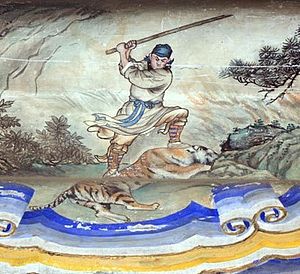Wu Sung
| Wu Song | |
|---|---|
| Water Margin character | |

|
|
| First appearance | Chapter 23 |
| Nickname | 1. "Pilgrim" 行者 |
| Also known as |
|
| Rank | 14th, Harm Star (天傷星) of the 36 Heavenly Spirits |
| Infantry leader of Liangshan | |
| Origin | Constable |
| Ancestral home / Place of origin | Qinghe County (in present-day Xingtai, Hebei) |
| Weapon | Pair of sabers, staff |
| Names | |
| Simplified Chinese | 武松 |
| Traditional Chinese | 武松 |
| Pinyin | Wǔ Sōng |
| Wade–Giles | Wu Sung |
| Other names | Wu the Second (武二郎) |
Wu Song, nicknamed "Pilgrim", is a fictional character in Water Margin, one of the Four Great Classical Novels of Chinese literature. He ranks 14th of the 36 Heavenly Spirits of the 108 Liangshan heroes. According to legend, Wu Song was a student of the archer Zhou Tong and he specialised in Chuojiao, Ditangquan, and the use of the staff.
Wu Song is from Qinghe County (in present-day Xingtai, Hebei). The novel describes him as a good-looking man with shining eyes, thick eyebrows, a muscular body and an impressive bearing. His parents died early, and he was raised by his elder brother, Wu Dalang (武大郎; literally "Eldest Brother Wu").
Wu Song once knocked a man unconscious in a drunken rage and mistakenly thought that he had killed that man. He goes on the run to avoid arrest and takes shelter in the residence of the nobleman Chai Jin. He meets Song Jiang there and becomes sworn brothers with him. He makes his journey home later after Song Jiang left.
On his way home, Wu Song passes by a tavern near Jingyang Ridge, where a large sign reads "After Three Bowls Do Not Cross Ridge" (三碗不過崗). This arouses his interest and he stops there for a break. The waiter explains to Wu Song that the wine sold at the tavern is so strong that customers usually get drunk after having three bowls and are unable to cross the ridge ahead, hence the sign. Wu Song is still sober after drinking three bowls and he demands that the waiter continue serving him wine. By the end of his meal, Wu Song had consumed 18 bowls of wine in total and appears drunk. He is about to leave when the waiter stops him and warns him about a fierce man-eating tiger at Jingyang Ridge. Wu Song suspects that the waiter is lying to him because he wants him to spend the night there to earn extra money, so he ignores the waiter and continues on his journey.
While crossing Jingyang Ridge, Wu Song sees an official warning sign and is now convinced that there is really a tiger at the ridge. However, he refuses to turn back because he knows that the waiter will laugh at him if he does. He moves on and is about to sleep when he sees a fierce tiger emerging from the woods. After narrowly evading three charges from the beast, Wu Song attempts to fight back, but accidentally breaks his staff and becomes weaponless. Under the influence of alcohol, he ends up slaying the tiger by pinning it to the ground and bashing its head repeatedly with his bare fists before finishing it off by beating it with his broken staff. He becomes famous for his heroic deed. The local magistrate of the nearby Yanggu County (in present-day Liaocheng, Shandong) offers him the job of a chief constable in the county office as a reward for his achievement. Wu Song accepts the job and settles down in Yanggu County, where he meets his elder brother, Wu Dalang, who has recently moved there.
...
Wikipedia
